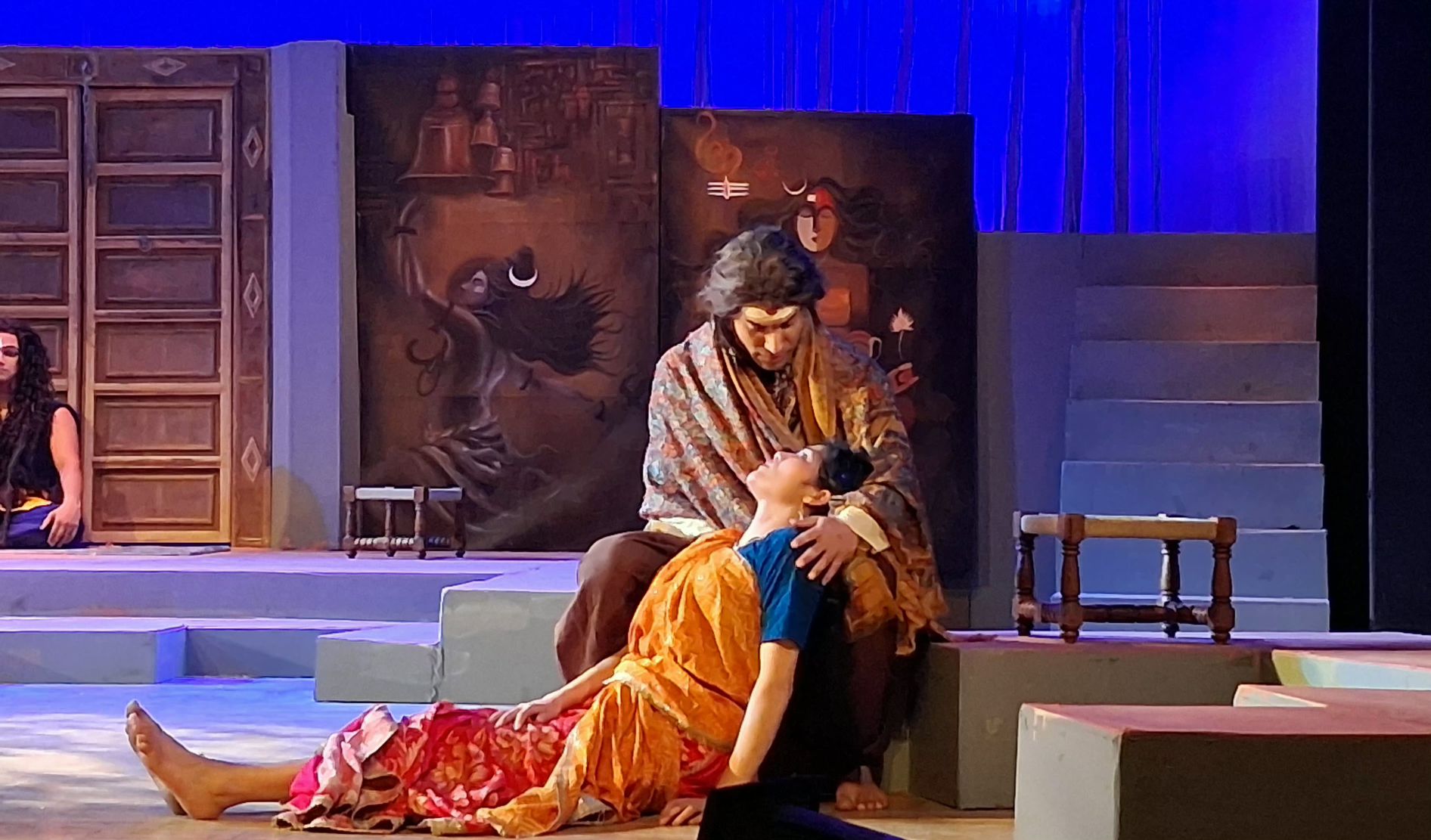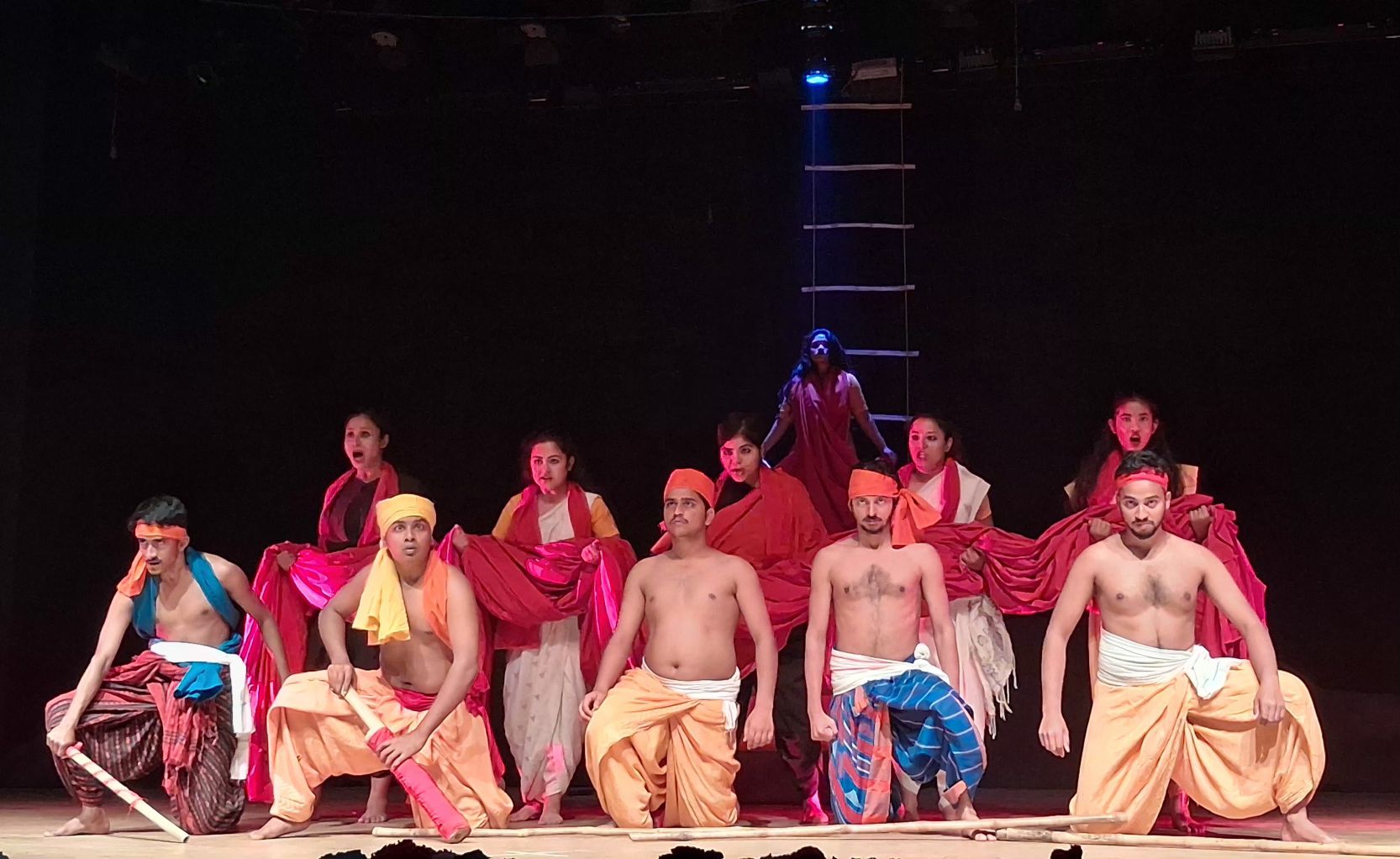Patna: On the concluding evening of three-day long theatre festival ‘Rangleela’ at Kalidas Rangalay in Patna on January 24, the organising group Bayaar staged play ‘Purushottam’.
Written and directed by Manoj Manave, the one-hour long play opens in a scene wherein Purush, a character represents males, is seen performing a yajna and chanting mantras. This way, he wins Roop Kanya. Here the director succeeds in drawing parallels between the practices performed in old days and now, to achieve the desired goals. In past, some rituals were performed with chanting a set of ‘mantras’. As of now, money and power are doing the same. Roop Kanya’s metaphorical use to send out the message touched a chord with the audience.
As the title suggests, the director presents the play in such a way that it makes the message loud and clear. He successfully shows how males in this male dominating society are trying to prove they are the ‘purushottams’.
Here it is pertinent to mention one scene wherein Purush is seen holding one end of the rope with the other end tied around Roop Kanya’s neck. This scene depicts how males always want to keep the females in their control. Then Roop Rasik arrives and makes Roop Kanya realise her strength, power and capability and gets her freed from Purush.
The play celebrates brilliance in using Classic, Persian and Realistic styles of presentation, giving its audience an engrossing viewing experience.
This reviewer feels the director must have done sufficient home work to produce such a production on not so easy a topic like this. It really makes a post mortem of meninism prevailing in our society in very satirical way, leaving the audience completely naked in front of the mirror.
Writer, director of the play, who is also the secretary of Bayaar, the host organisation, Manoj Manave also did justice to his character Purush. The play has total four characters and other three artistes–Indrabhushan Akash (Roop Rasik), Mahima (Roop Kanya) and Sagar Kumar Soni (Sanket)– tried to give their best.
Yes, the music and light design by Jishan Sabir and Raj Kapur respectively need a bit improvement.
The inaugural play ‘Gagan Ghata Ghahraani’ was staged by Nirman Kala Manch, one of the prominent theatre institutions in Patna. The play delves into the life of Kabir Das, a 15th-century poet and saint, and presented some still relevant principles of his life to the theatre lovers.
Kabir is known for being critical of power and religion. He would raise his voice whenever common people became target of people in power. In a nutshell, it can be said that the saint’s ‘banis’ are the mainstay of the play, urging people to shun greed for power and embrace love and brotherhood, dedicating fully to God.
Sanjay Upadhyay’s direction needs special mention. The play suggested one thing and that is the tremendous home work he did to make the play come alive. The choice of artistes for various characters was perfect. They did their best to keep the audience till last scene. Md Jafar Alam did justice to his Kabir character. Sanjay Upadhyay’s music played vital role in making the play more enjoyable.
‘Dhundh’, a drama based on the story of Rabindranath Tagore, was staged on January 23 by Rang Manch, a Patna based theatre organisation. Stage adaptation by Mrutyunjay Sharma.
The story, set in British era, revolves around Shashi Bhushan and Giribala, who are in love. But their love meets a pathetic end with Giribala being forcibly married off to an aged landlord and Sashi Bhushan arrested by Englishmen. All the artistes in general and Raj Patel and Nupur Chakraborty’s portrayal of Shashi Bhushan and Giribala characters respectively in particular left the audience hooked to their seats.
Worth mentioning, Nupur is the director of this play. Bhrigu Rishi Kumar and Jishen Sahir’s stage design, Roshan Kumar Keshri’s music and Mrutyunjay Sharma’s light design made a difference.
This was the first edition of ‘Rangleela’ theatre festival supported by the Ministry of Culture, Government of India and organised by ‘Bayaar’, one of the reputed theatre organisations in the state.
By kalasanskruti
Photo courtesy: Bayaar




